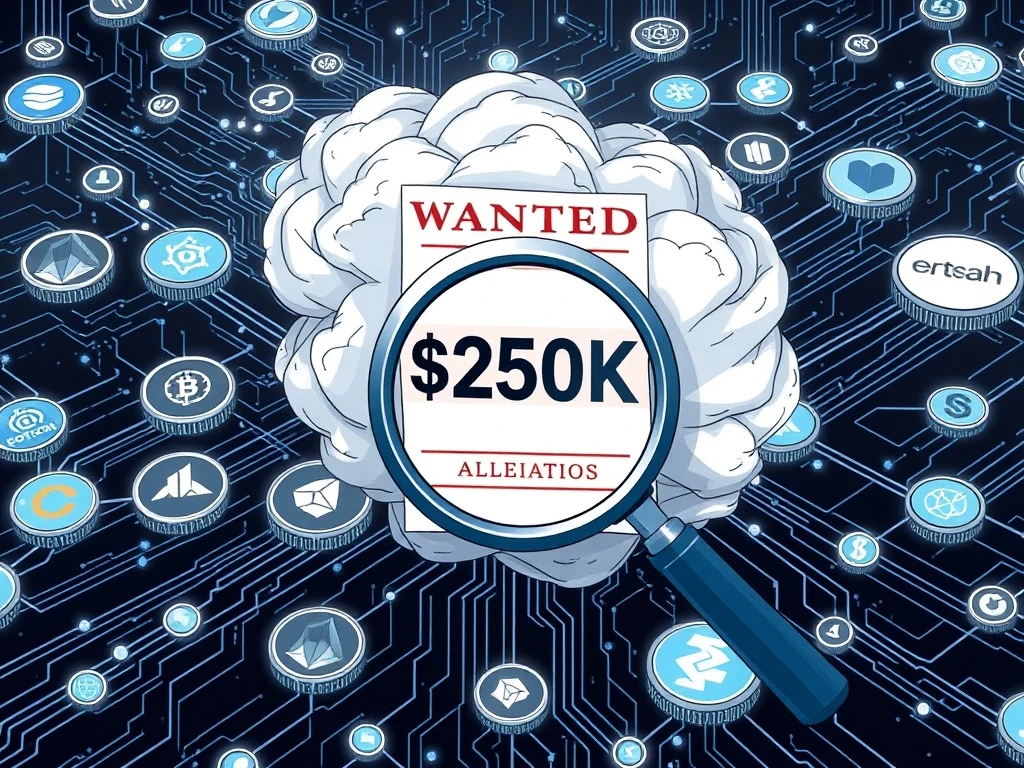Ocean Protocol Faces Alarming $250K Bounty Amidst Crypto Dump Scandal

A significant controversy now engulfs Ocean Protocol. The project faces a staggering $250,000 bounty. This reward relates to serious crypto dump allegations. Specifically, these claims involve a purported $120 million token transfer. This unfolding drama captures widespread attention across the cryptocurrency landscape. Investors and enthusiasts closely watch these developments. Such events often highlight critical issues within decentralized ecosystems.
Ocean Protocol at the Center of a Heated Controversy
The feud between Fetch.ai CEO Humayun Sheikh and the Ocean Protocol Foundation has intensified. Sheikh recently issued a substantial bounty. This reward aims to uncover more information. It targets the signatories of OceanDAO’s multisignature wallet. Their connection to the Ocean Protocol Foundation is also under scrutiny. A multisig wallet, by design, requires multiple approvals. This ensures security for transactions. Consequently, the actions taken from such a wallet carry significant weight.
This $250,000 bounty offer follows days after earlier claims. The Fetch.ai CEO alleged that an Ocean Protocol-linked team wallet misappropriated approximately 286 million Fetch.ai (FET) tokens. These tokens were valued at about $80 million at the time. The alleged misappropriation occurred during a crucial period. This was the 2024 merger of the Artificial Superintelligence (ASI) Alliance. This alliance sought to combine Fetch.ai, Ocean Protocol, and SingularityNet. They aimed for a unified token framework. The allegations, therefore, strike at the heart of this significant industry collaboration.
Unpacking the ASI Alliance Merger and Token Transfers
The ASI Alliance merger represented a bold step. It aimed to create a decentralized AI powerhouse. This initiative would bring together three leading projects. These included Fetch.ai, Ocean Protocol, and SingularityNet. Their goal was a shared token framework. This framework would unify their respective ecosystems. Sheikh claims Ocean Protocol minted and transferred millions of OCEAN tokens. This happened before the merger. They then allegedly converted these tokens into FET. Following this, they moved them to centralized exchanges. Crucially, these actions reportedly lacked necessary disclosures. Such a lack of transparency could undermine trust. It could also violate agreed-upon merger terms. Therefore, the dispute carries significant implications for future collaborations.
Humayun Sheikh voiced his concerns publicly. He utilized social media platforms, including X. His posts detailed the alleged activities. He specifically pointed to a team wallet associated with Ocean Protocol. This wallet purportedly executed these transfers. The CEO’s public statements fueled the controversy. They also brought the matter to a broader audience. Source: Humayun Sheikh
On-Chain Data Fuels Crypto Dump Allegations
Crypto dump allegations gained significant traction from on-chain data. Blockchain data platform Bubblemaps provided key insights. Despite Ocean Protocol’s denials, this data points to specific transactions. An Ocean Protocol-linked multisignature wallet reportedly converted approximately 661 million Ocean tokens. These were then exchanged for 286 million FET coins. This conversion represents a massive movement of assets. Bubblemaps further detailed the destination of these tokens. An estimated 270 million FET tokens went to Binance or an OTC provider. The total value reached around $120 million. This included 160 million FET tokens transferred to Binance. Another 109 million went to GSR Markets. These movements occurred under contentious circumstances. Source: Bubblemaps
Bubblemaps’ analysis highlighted a crucial point. They noted that the Ocean Protocol team maintained a large amount of $OCEAN in their wallets. These were supposedly for ‘community incentives’ and ‘data farming.’ However, the subsequent transfers raised questions. These actions directly contradict the stated purpose. They also fuel suspicions of a deliberate dump. The timing, coinciding with the ASI Alliance merger, is particularly sensitive. This adds another layer of complexity to the situation. Ocean Protocol ultimately withdrew from the Artificial Superintelligence Alliance on October 9. Their announcement made no mention of these substantial token transfers. This omission further intensified scrutiny.
Fetch.ai CEO’s Stance and Legal Threats
The feud escalated into serious legal threats. Humayun Sheikh pledged to fund class-action lawsuits. He plans these across three or more jurisdictions. He also called on major entities to investigate. These included Binance, GSR, and ExaGroup. Such calls demonstrate the gravity of the situation. They also signal Sheikh’s determination to pursue justice. Consequently, the cryptocurrency community watches closely. They await responses from these key players. Binance exchange subsequently announced ceasing support for OCEAN token deposits. This occurred on Thursday. However, Binance did not explicitly link this decision to the ongoing dispute. Nevertheless, the timing suggests a possible connection. This move further complicated matters for Ocean Protocol.
The escalating dispute also impacted the market. The Fetch.ai (FET) token price experienced a notable decline. It fell 9% in the past 24 hours. FET was trading at $0.25 as of 8:47 pm UTC. Crypto News Insights data confirmed this drop. Such price volatility often reflects investor uncertainty. It also highlights the broader market’s reaction to controversies. The long-term implications for FET remain uncertain. The ongoing legal battle could introduce further instability. FET/USD, 1-month chart. Source: Crypto News Insights
Understanding the Role of Multisig Wallets in Blockchain Dispute
A blockchain dispute like this highlights the importance of security features. Multisignature, or multisig, wallets are critical tools. They enhance security in cryptocurrency transactions. A multisig wallet requires multiple private keys to authorize a transaction. This means no single person can move funds independently. For instance, a 2-of-3 multisig wallet needs two out of three designated key holders to approve a transfer. This design prevents single points of failure. It also reduces the risk of unauthorized access. In the context of OceanDAO, the multisig wallet holds significant community assets. Therefore, identifying its signatories and their affiliations becomes crucial. Sheikh’s bounty directly targets this information. It seeks to uncover who controlled these substantial token movements. Understanding these roles is vital for accountability. It also helps in resolving the current allegations.
Ocean Protocol formally denied the allegations. This happened on Thursday. They stated they would prepare a formal response. This response will address the “various unfounded claims.” The community awaits this official statement. It may shed more light on the team’s perspective. Furthermore, it could provide details regarding the token transfers. Transparency in such situations is paramount. It helps maintain trust within the decentralized ecosystem. Ultimately, the resolution of this dispute will set precedents. It will influence how similar issues are handled in the future. This emphasizes the importance of clear communication from all parties involved.
Implications for Trust and Transparency in Decentralized Finance
This ongoing blockchain dispute carries significant implications. It affects more than just Ocean Protocol and Fetch.ai. It touches upon the broader decentralized finance (DeFi) landscape. Investor trust is a fragile commodity. Allegations of misappropriation can severely damage it. Transparency is also a cornerstone of DeFi. Projects must uphold high standards. They need to provide clear disclosures. These disclosures should cover token movements and strategic decisions. Failure to do so erodes confidence. It also raises questions about project governance. The industry relies on robust auditing. It also needs strong community oversight. These mechanisms ensure accountability. They also protect investor interests. Ultimately, the outcome of this dispute could influence regulatory approaches. It might also shape best practices for future mergers and token management.
The cryptocurrency market continues to evolve. Events like these serve as crucial reminders. Due diligence is essential for investors. Projects must prioritize ethical conduct. They also need to maintain open communication. The resolution of this situation will be closely watched. It could redefine expectations for transparency. It may also reshape accountability within the blockchain space. Therefore, the impact extends far beyond the immediate parties. It affects the entire ecosystem. The community hopes for a swift and fair resolution. This will help restore confidence. It will also reinforce the principles of decentralization.









